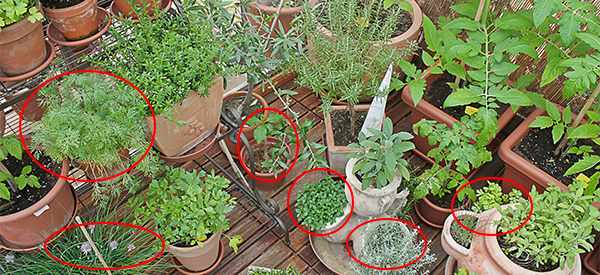
10 Natural Antibiotics You Can Find in Your Garden
Antibiotics are a life-saving tool when used appropriately, but in 2018, the World Health Organization (WHO) stated, “antibiotic resistance is one of the biggest threats to human health, food security, and development today.” Because bacteria, having been on Earth for about 3.5 billion years, are extremely adaptable, they are able to change and become resistant to antibiotic medicines. Unfortunately, antibiotic misuse and overuse have enabled many infectious disease-causing bacteria to become resistant, making it much harder to treat these diseases. Studies have shown that some doctors may prescribe antibiotics before they know whether an infection is viral or bacterial, even though, if the problem is viral, antibiotics will not help. However, nature has long provided powerful alternatives to pharmaceutical antibiotics. Garlic, onion, cranberry, horseradish, Oregon grape, oregano, thyme, honey, apple cider vinegar, and even certain homemade remedies can offer natural antibacterial protection. These 10 natural antibiotics you can find in your garden have been used for centuries to fight infections, support the immune system, and may help reduce reliance on pharmaceutical antibiotics.
Certainly, there is an important role for antibiotics in healthcare, particularly for those suffering from multiple issues or other problems which may affect the immune system. It is important to have your doctor diagnose any serious ailment as it could be more than a small bacterial infection and other treatment options may need to be considered.
That being said, being able to prevent and treat minor ailments at home using plants from your own back yard could be easier than you think and could help boost your own immune system while you’re at it. Interestingly, the WHO estimates that over half of the world’s population still rely on traditional, plant-based medicine, many of which we can even grow ourselves.
Garlic (Allium sativum)
To say I am fan of garlic would be an understatement. As I prepare for this year’s garlic harvest, which will happen in a couple of weeks, I’m slowly using up the last of last year’s harvest.
The garlic is double cured and stored at a consistent cool temperature in the root cellar in the dark. I grow eight varieties of hard neck garlic, as hard neck garlic is hardier than the soft neck garlic grown in warmer climates. The garlic from the garden enables me to travel the world in my kitchen as so many cultures use garlic in their cuisines.
The health benefits of garlic are many with scientific studies showing garlic having antibiotic properties in addition to a wide range of therapeutic and preventative attributes including reducing cancer risk, cardiovascular risk factors, and as an antioxidant and detoxifying agent. There is evidence that garlic has antifungal and antiviral benefits also.
For health benefits, raw garlic works best, though I admit it’s a challenge even for me.
I cook with garlic often and still find it beneficial, but research shows raw garlic provides the most potency.
When chopped or crushed, garlic releases allicin, its main bioactive compound. Some studies suggest aged raw garlic contains even more beneficial compounds.
I would suggest experimenting to find a way that you enjoy raw garlic to maximize its healthful potential. It is available in tinctures and supplemental forms as well.
One way I use raw garlic is in homemade tzatziki, which is delicious, but I’m not sure you could eat it everyday. However, it might be something you could add in here and there to increase your raw garlic intake.
Tzatziki
 1 to 2 cloves garlic, peeled and chopped
1 to 2 cloves garlic, peeled and chopped- ½ cucumber, peeled, deseeded, grated, and excess moisture pressed out
- 2 tablespoons fresh dill weed, or 1 tablespoon dry dill weed
- 2 cups plain natural or Greek-style yogurt
- 1 tablespoon lemon juice
Mix all ingredients together and let stand for a few hours or overnight. Serve as a refreshing dip with Greek-style food such as souvlaki, as a vegetable dip or accompanied with your favourite humus.
Onion (Allium Cepa L.)
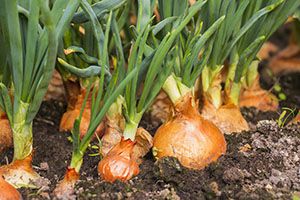
Garlic fills one-sixth of my garden, and onions take up another. I equally love these aromatic, healthful alliums.
I harvest, cure, and store onions, which usually last until March in the root cellar, depending on the variety.
For centuries, folklore has praised onions for their healing powers, from warding off germs to curing colds with onion slices in socks.
Scientific evidence on these claims is limited, but studies confirm onion water extract fights six disease-causing bacteria.
Onions show antibacterial effects against MRSA, MSSA, E. coli, P. aeruginosa, Klebsiella Spp., and Salmonella Spp. This is promising for antibiotic resistance.
Cranberry (Vaccinium oxycoccos)
In the Rocky Mountains, wild cranberries grow along riverbanks and were once commonly harvested. However, most people now buy commercial cranberry products.
Cranberries help fight E. coli infections because they contain A-type proanthocyanidins, which alter the bacteria’s surface properties.
E. coli causes 85% of urinary tract infections, which can lead to acute pyelonephritis, a serious kidney inflammation.
Horseradish (Armoracia rusticana)
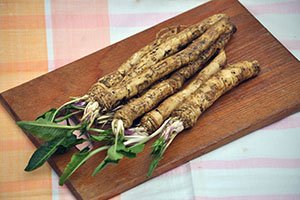
My father-in-law discovered the secret to growing and making excellent horseradish sauce, but he hasn’t shared it with me.
Horseradish belongs to the brassica family and contains isothiocyanates (ITCs), which studies show fight E. coli, H. pylori, and C. difficile.
Research suggests that eating raw brassicas, like horseradish, broccoli, and cabbage, preserves their antibacterial properties better than cooking them.
Oregon Grape (Mahonia aquifolium)
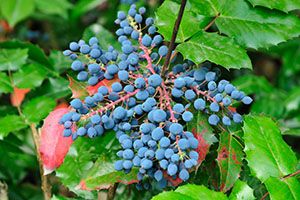
Berberine is an antibacterial component found in Oregon grape and a few other plants such as Goldenseal. There is evidence of a synergistietween berberine and c interaction bantibiotic agents against some broad-spectrum microorganisms.
Oregon grape is a holly-like, wild plant native to western North America which grows in forested areas and is sometimes found in the home garden as an ornamental plant. The berries are blue and small, edible but very sour and could be used as an outdoor emergency antibacterial agent.
Oregano (Origanum vulgare)
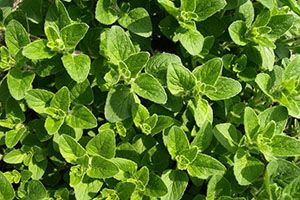
Not only is oregano a delicious, powerful herb for cooking, it is an easy to grow herbaceous perennial.
As it contains carvacrol and thymol, it is also a powerful antibacterial agent. In laboratory testing, oregano extract had impressive antibacterial activity against all tested bacteria, including 13 bacterial strains and 6 fungi.
Thyme (Thymus vulgaris)
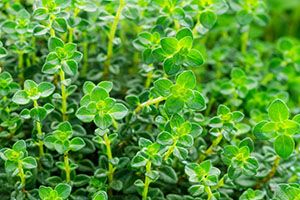
A very special herb which grows fairly slowly with a short harvest window, thyme is potentially my favorite herb. It is also noteworthy as an antimicrobial agent in that it also contains thymol and in laboratory tests has shown antibacterial activity against 35 microorganisms.
Honey
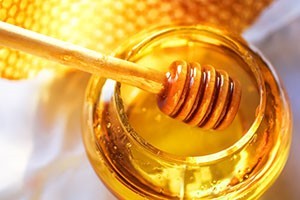
We use a lot of honey because our area has many apiaries, and competition for the best honey is intense.
Beekeepers debate how elevation and local wildflowers affect honey quality, much like sommeliers discuss wine characteristics.
Researchers have extensively studied honey’s therapeutic benefits, linking its antibacterial properties to its hydrogen peroxide content.
Different honey varieties contain varying levels of hydrogen peroxide and other antibacterial compounds.
Factors like harvest time, location, and the flowers bees pollinate influence honey’s antibacterial strength.
Famously, Manuka honey may be much more potent than other types
Apple Cider Vinegar
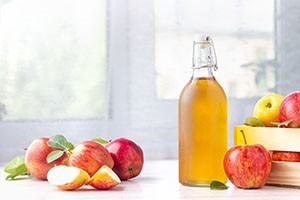
The production of vinegar goes back at least 5,000 years. The Old Testament and Hippocrates reference apple cider vinegar with honey for infections.
It was used to combat infections and protect open skin wounds. In addition to its health benefits, laboratory studies confirm its antimicrobial action.
Apple cider vinegar has been shown to work against E. coli, S. aureus, and C. albicans.
Although honey and apple cider vinegar don’t grow as plants, they can be made at home. They rely on the natural environment, apples, or apple trees.
Because of their antibacterial properties and ability to be homemade, they are included on this list.
Antibiotic salad dressing
 2 cloves crushed garlic
2 cloves crushed garlic- 2 tablespoons honey
- ½ cup apple cider vinegar
- Mix these three ingredients until honey is diluted in vinegar, then add:
- 2 tablespoons chopped oregano
- 1 teaspoon chopped thyme
- 1¼ cup extra virgin olive oil or your favorite salad oil
- Salt and pepper to taste. Mustard is often a nice touch in this recipe also.
There are plant-based antibiotics surrounding us in nature, the garden, and the grocery store. By utilizing some of these plants in our diet as well as medicine, we may be able to keep ourselves out of the doctor’s office while our immune system keeps our good and bad bacteria in check. Thank you for reading.
You may also like:
How to Make Black Drawing Salve for Boils, Wounds and Tick Bites
Similar to Morphine: The Best Natural Painkiller that Grows in Your Backyard (Video)
8 Medicinal Herbs You Should Be Picking This Summer

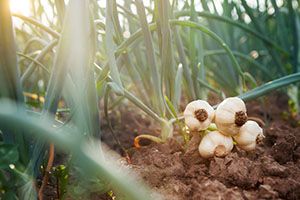
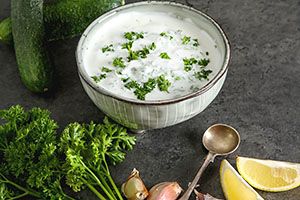 1 to 2 cloves garlic, peeled and chopped
1 to 2 cloves garlic, peeled and chopped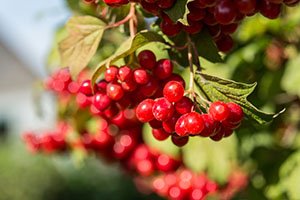
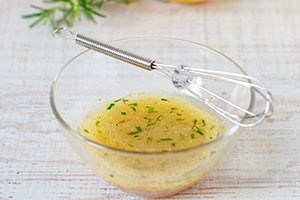 2 cloves crushed garlic
2 cloves crushed garlic
Nine and salad dressing recipe! Thank you, awesome information. God bless you and all you do.
Hi Evonne,
Thank you for your comment.
We really appreciate it.
God bless!
The salad dressing is amazing! I’ve been looking for some better alternatives now that I’m gluten free. This dressing tastes wonderful!
Hi Carol,
Thank you so much for your comment.
We are glad to hear that you liked our article, especially the salad dressing.
There are many healthy alternatives to replace gluten. I hope your gluten free journey will be easy and fun.
God bless!
I used oil of oregano to kick strep when my whole family got it and I couldn’t make it to the doctor… The kids went to the doctor and I put 8 drops in orange juice and drank that every day and in the morning I would gargle 16 drops in water……… The only complaint I had was that my burps tasted like pizza….
Hi Daniel,
Thank you so much for your comment and for sharing your experience with us.
God bless!
Would unsea help to get rid of my drug resistance to e-coli and the nasty bad bacteria from a bladder infection or whatwould you recommend touseand where would I get them?
Hi Deborah,
Thank you so much for your comment.
It was found that one teaspoon of cinnamon added to the juice killed 99.5 per cent of the bacteria- E Coli- within three days.
Additionally, I recommend you garlic and oregano oil for your bladder infection.
God bless!
What would you recommend for bladder infection. I have Mersa and ecoli. Bacteria.
Hi Deborah,
Thank you so much for your comment.
It was found that one teaspoon of cinnamon added to the juice killed 99.5 per cent of the bacteria- E Coli- within three days.
Additionally, I recommend you garlic and oregano oil for your bladder infection.
God bless!
[…] 10 Natural Antibiotics You Can Find in Your Garden […]
Love, love all ur info ! Thanks for the salad dressing recipe…can’t wait to try
Hi Susan,
Thank you so much for your comment.
We really appreciate your feedback.
God bless!
[…] 10 Natural Antibiotics You Can Find in Your Garden […]
Thank you so much for these information I should be writing them down because I can’t find some when I go back to use them They are truly God sent in times like these when doctors are failing us
Hi Hester,
Thank you so much for your feedback.
You can also print or save these articles using the Print/PDF green button at the end of each article..just before the comment section.
Many blessings and good health!
I really like your posts because they are precise and straight to the point. Very effective I have tried the energy smoothies, onion under the foot etc. Thank you Dr Nicole
[…] 10 Natural Antibiotics You Can Find in Your Garden […]